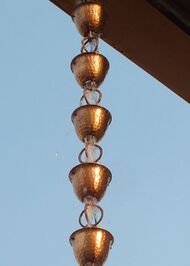Chemistry:Rain chain
Rain chains (Japanese: 鎖樋, Script error: The function "transl" does not exist. or Script error: The function "transl" does not exist.,[1] literally "chain-gutter") are alternatives to a downspout. They are widely used in Japan. Their purpose is largely decorative, to make a water feature out of the transport of rainwater from the guttering downwards to a drain or to a storage container. (Rainwater is sometimes collected for household usage.) They can also be found on temples.[2]
Rain chains are typically either a series of metal cups, chained together with a hole in the bottom of each, or chain links that span vertically.[2] Rain water run-off gets distributed from a rooftop gutter downward through the rain chain.
File:Rain chain at japanese temple - july 4 2021.webm Rain chains have also been used in the West. Nordic vernacular architecture often used a simple stick as a rainwater guide, in similar fashion. They have also been used in the Modernist era, to juxtapose metal chains with a concrete or Portland stone facade. They are often seen in cup-shape, link and loop style, as well as decorative.[3]
References
- ↑ Breen, Jim, ed. "鎖樋". WWWJDIC. http://nihongo.monash.edu/cgi-bin/wwwjdic?1MDJ%BA%BF%C8%F5. See rendaku for why multiple pronunciations.
- ↑ 2.0 2.1 Dunnett, Nigel; Clayden, Andy (2007). Rain Gardens. Portland, Or.: Timber Press. pp. 85–87. ISBN 9780881928266. OCLC 269310925.
- ↑ "Rain Chains" (in en-US). https://rockstarraingutters.com/rain-chains/.
Further reading
- Pleasant, Barbara (2006). "Make a Rain Chain". Easy Garden Projects to Make, Build, and Grow: 200 Do-It-Yourself Ideas to Help You Grow Your Best Garden Ever. Emmaus, Pa.: Rodale. pp. 147. ISBN 9780899093994. OCLC 62782168. https://books.google.com/books?id=y9GpDTUwG4kC&pg=PA147.
 |



